2024年中考英语总复习课件:第一部分 教材梳理 第10讲 八年级下册 Units 3—4
文档属性
| 名称 | 2024年中考英语总复习课件:第一部分 教材梳理 第10讲 八年级下册 Units 3—4 |
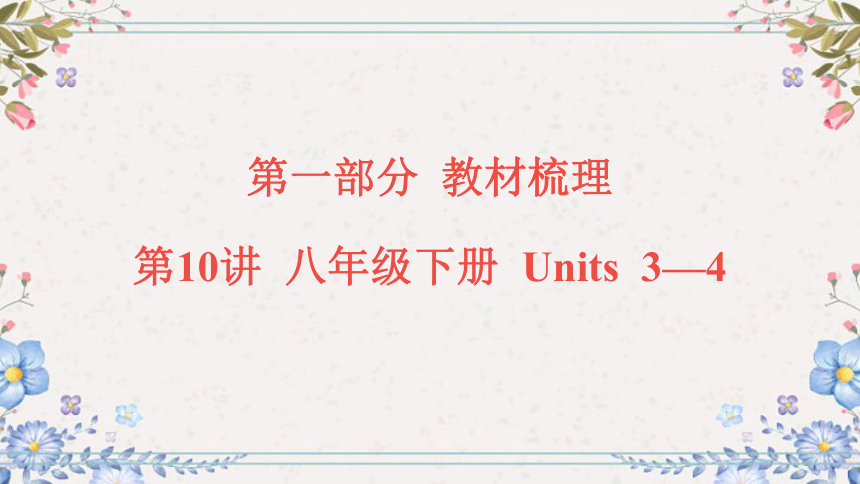
|
|
| 格式 | pptx | ||
| 文件大小 | 1.2MB | ||
| 资源类型 | 教案 | ||
| 版本资源 | 人教新目标(Go for it)版 | ||
| 科目 | 英语 | ||
| 更新时间 | 2024-02-28 00:00:00 | ||
图片预览

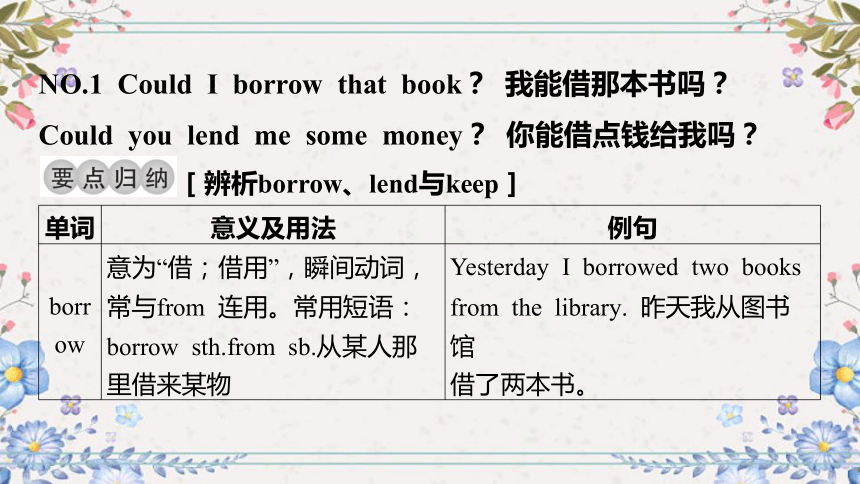
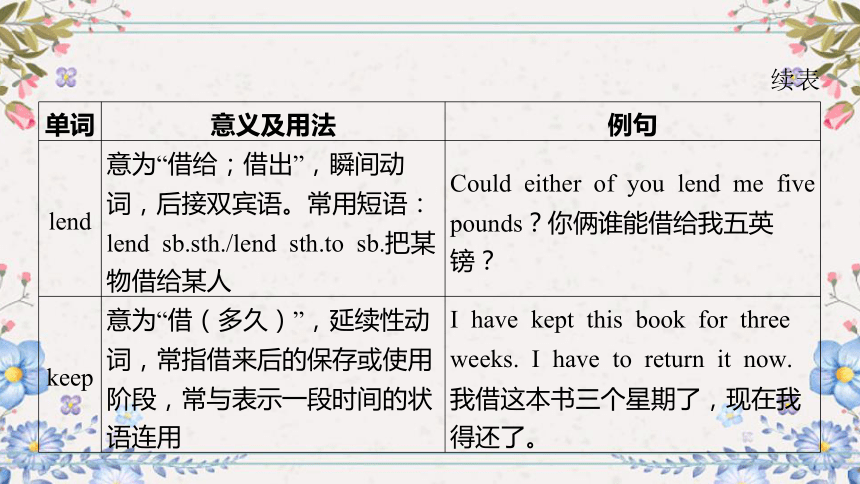
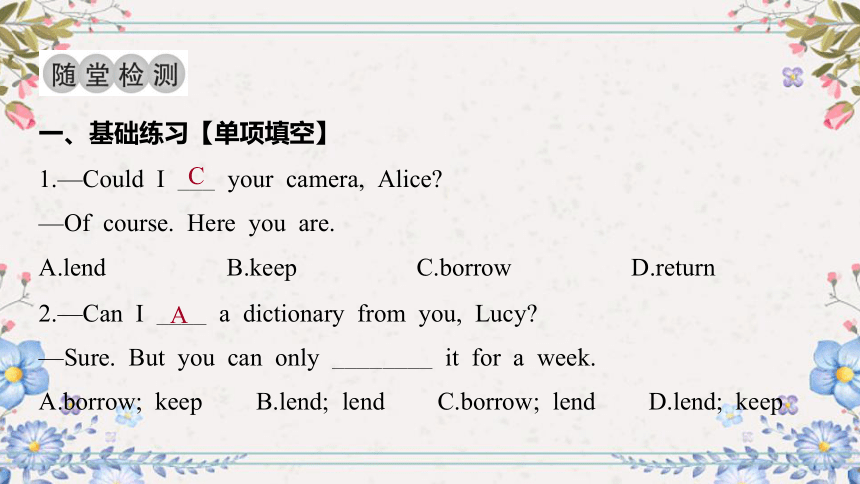
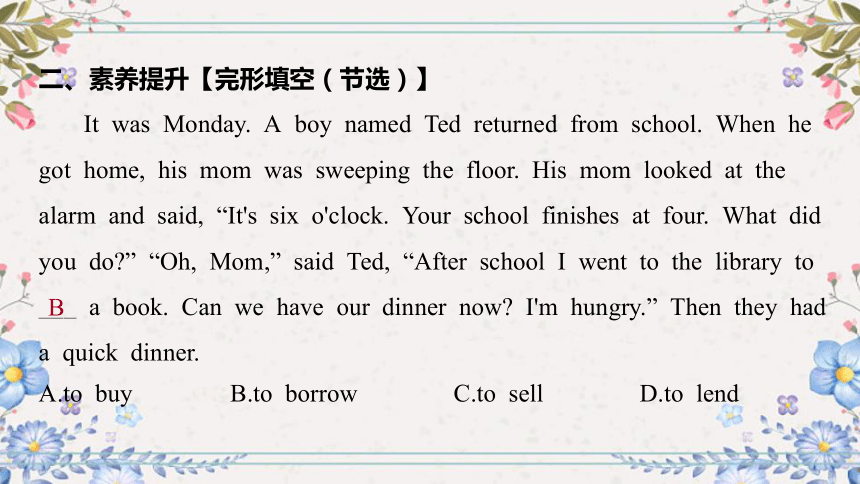
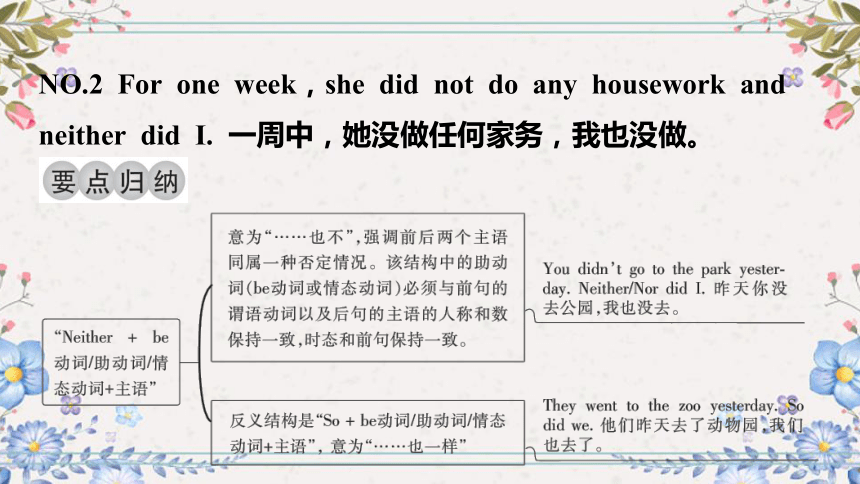
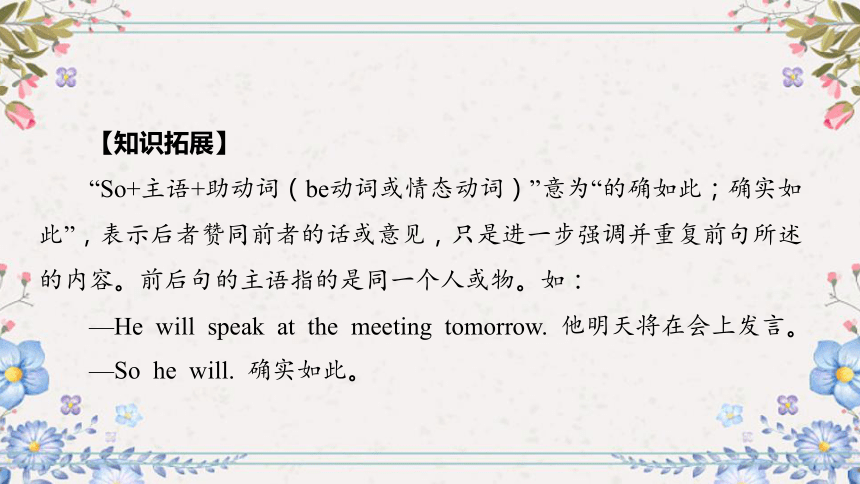
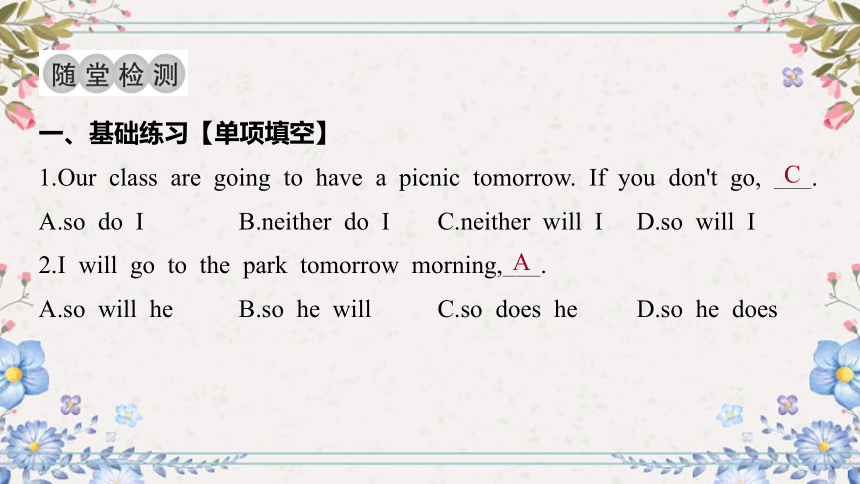
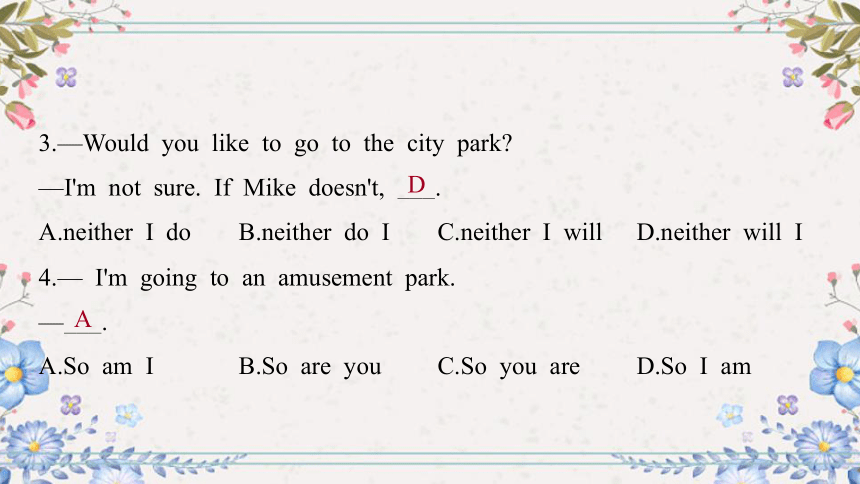
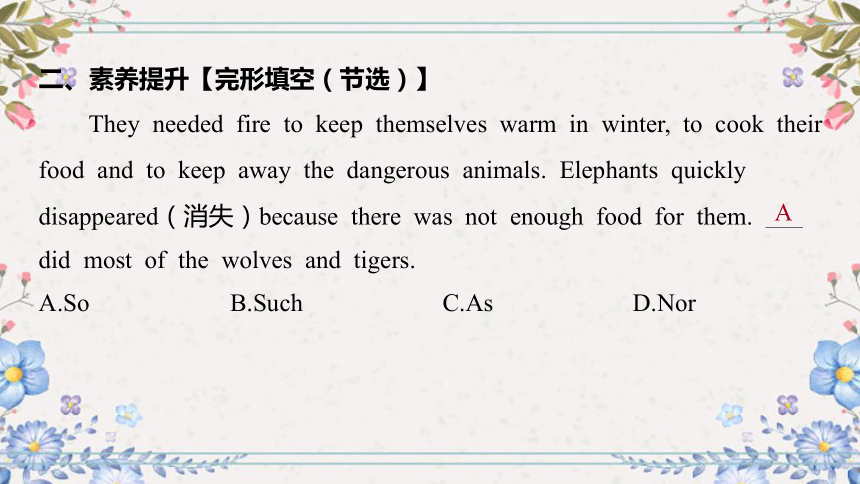
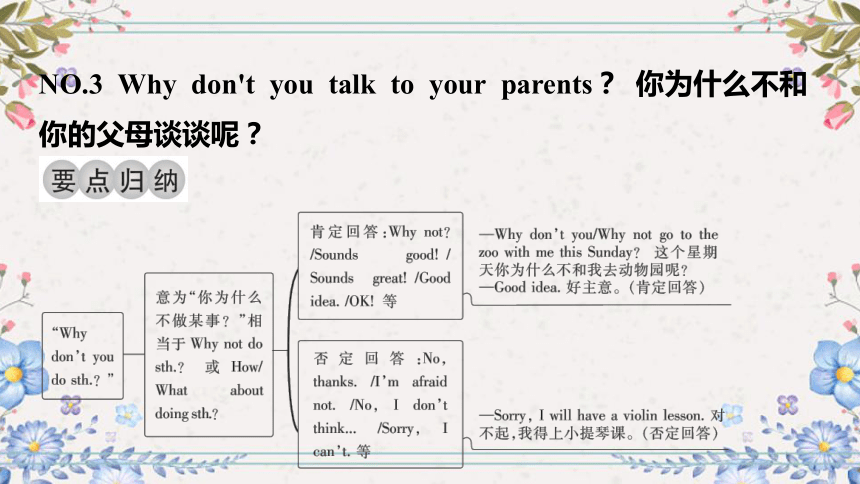
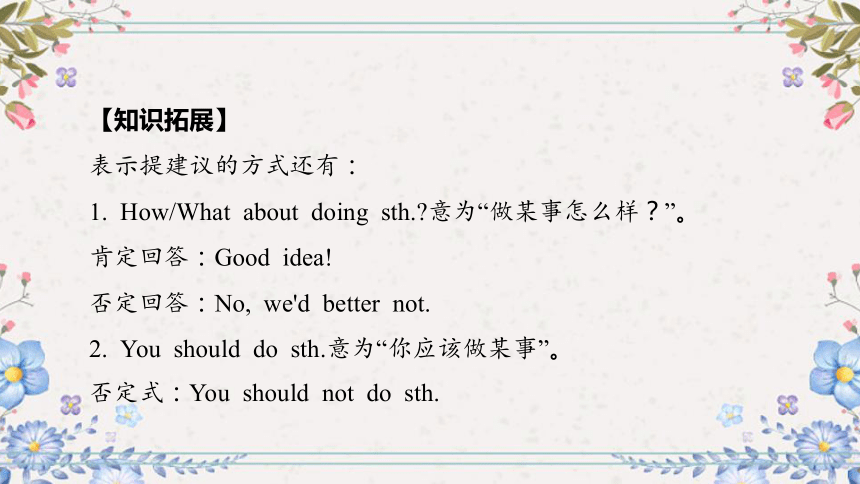
文档简介
(共36张PPT)
第一部分 教材梳理
第10讲 八年级下册 Units 3—4
NO.1 Could I borrow that book? 我能借那本书吗?
Could you lend me some money? 你能借点钱给我吗?
[辨析borrow、lend与keep]
单词 意义及用法 例句
borr ow 意为“借;借用”,瞬间动词, 常与from 连用。常用短语: borrow sth.from sb.从某人那 里借来某物 Yesterday I borrowed two books
from the library. 昨天我从图书馆
借了两本书。
单词 意义及用法 例句
lend 意为“借给;借出”,瞬间动 词,后接双宾语。常用短语: lend sb.sth./lend sth.to sb.把某 物借给某人 Could either of you lend me five
pounds?你俩谁能借给我五英
镑?
keep 意为“借(多久)”,延续性动 词,常指借来后的保存或使用 阶段,常与表示一段时间的状 语连用 I have kept this book for three
weeks. I have to return it now.
我借这本书三个星期了,现在我
得还了。
续表
一、基础练习【单项填空】
1.—Could I ___ your camera, Alice
—Of course. Here you are.
C
A.lend B.keep C.borrow D.return
2.—Can I ____ a dictionary from you, Lucy
—Sure. But you can only ________ it for a week.
A.borrow; keep B.lend; lend C.borrow; lend D.lend; keep
A
二、素养提升【完形填空(节选)】
It was Monday. A boy named Ted returned from school. When he
got home, his mom was sweeping the floor. His mom looked at the
alarm and said, “It's six o'clock. Your school finishes at four. What did
you do ” “Oh, Mom,” said Ted, “After school I went to the library to
___ a book. Can we have our dinner now I'm hungry.” Then they had
a quick dinner.
B
A.to buy B.to borrow C.to sell D.to lend
NO.2 For one week,she did not do any housework and
neither did I. 一周中,她没做任何家务,我也没做。
【知识拓展】
“So+主语+助动词(be动词或情态动词)”意为“的确如此;确实如
此”,表示后者赞同前者的话或意见,只是进一步强调并重复前句所述
的内容。前后句的主语指的是同一个人或物。如:
—He will speak at the meeting tomorrow. 他明天将在会上发言。
—So he will. 确实如此。
一、基础练习【单项填空】
1.Our class are going to have a picnic tomorrow. If you don't go, ___.
C
A.so do I B.neither do I C.neither will I D.so will I
2.I will go to the park tomorrow morning,___.
A
A.so will he B.so he will C.so does he D.so he does
3.—Would you like to go to the city park
—I'm not sure. If Mike doesn't, ___.
D
A.neither I do B.neither do I C.neither I will D.neither will I
4.— I'm going to an amusement park.
—___.
A
A.So am I B.So are you C.So you are D.So I am
二、素养提升【完形填空(节选)】
They needed fire to keep themselves warm in winter, to cook their
food and to keep away the dangerous animals. Elephants quickly
disappeared(消失)because there was not enough food for them. ___
did most of the wolves and tigers.
A
A.So B.Such C.As D.Nor
NO.3 Why don't you talk to your parents? 你为什么不和
你的父母谈谈呢?
【知识拓展】
表示提建议的方式还有:
1. How/What about doing sth. 意为“做某事怎么样?”。
肯定回答:Good idea!
否定回答:No, we'd better not.
2. You should do sth.意为“你应该做某事”。
否定式:You should not do sth.
3. Let's do sth.意为“让我们做某事”。
否定式:Let's not do sth.
肯定回答:Good idea!
否定回答:Sorry, I can't.
4. You'd better do sth.意为“你最好做某事”。
否定式:You'd better not do sth.
5. Shall we do sth. 意为“我们做某事,好吗?”。
肯定回答:Good idea!
否定回答:Sorry, I can't.
一、基础练习【单选填空】
1.___ go and ask Miss Zhao when you don't understand
C
A.Why don't B.What about C.Why not D.Would
2.—Dad, may I borrow some money
—___ To buy some books
A
A.What for B.What about C.How about D.How for
二、素养提升【完形填空(节选)】
The park has five different sections (部分) called “lands”. Each
land has its own unusual and exciting features(特点).The five different
lands are called Main Street USA,Adventureland, Frontierland,
Fantasyland and Discoveryland. After visiting the lands, you can have
a meal in one of the many restaurants in the park or you can meet
Mickey Mouse and Donald Duck. ___ not visit Disney Village In
Disney Village you can relax and enjoy the beautiful scenery, go
shopping or visit a nightclub.
D
A.What B.How C.When D.Why
NO.4 They should spend their time on schoolwork in
order to get good grades and get into a good university.
为取得好成绩并考上好大学,他们应该将时间花在学业上。
[in order to的用法]
一、基础练习【根据汉语补全句子,一空一词】
1.为了让自己高兴起来,她决定去海边度假。
___ ______ ___ cheer herself up, she decided to go to the seaside for
a holiday.
In
order
to
2.为了完成我的作业,我在网上找了一些信息。
___ ______ ___ finish my homework, I found some information on
the Internet.
In
order
to
二、素养提升【完形填空(节选)】
If you want others to like and respect you, you have to start by
liking and accepting yourself. Do not change yourself ___ please(取悦)
others. Be helpful to everyone and do it happily.
A
A.in order to B.as soon as C.depend on D.as long as
NO.5 My parents don't allow me to hang out with my
friends. 我父母不允许我和朋友们外出闲逛。
[allow的用法]
一、基础练习【用所给词的适当形式填空】
1.My mother doesn't allow me ______(go) to the KTV. What about
you
2.We do not allow _________ (smoke) here.
3.We are allowed ________ (read) in the library.
to go
smoking
to read
二、素养提升【完形填空(节选)】
That's a very hard situation to be in. Imagine you have only a little
room in your car to take a few of your things. It's really not easy for
sure. We got our things and headed out. The next day we were ___
back. It was the hardest day of my life. Our house was gone.
C
A.allow B.allowing C.allowed D.allows
NO.6 If your parents are having problems,you should
offer to help. 如果你的父母遇到问题,你应该主动提供帮助。
[辨析offer和provide]
一、基础练习【选词填空】
provide offer
1.The hotel _________ a shoe-cleaning service for guests.
2.The school ______ places to students who can show talent.
3.He was able to ________ the police with some valuable information.
provides
offers
provide
二、素养提升【完形填空(节选)】
Humans should provide animals ___ food and places. Social groups
should take part in improving the environment. Let's take action to save
all the animals in danger now!
A
A.with B.for C.to D.in
NO.7 And they are always comparing them with other
children. 而且他们总是把他们与其他孩子做比较。
[compare的用法]
考点 含义及用法 例句
compare…with… 常用于同类比较,意 为“把…… 和……做比较” Let's compare this photo with that
one. 让我们把这张照片和那张照片做
一下比较。
compare …to… 常用于异类相比、比 喻,意为 “把……比作……” Children are often compared to happy
birds. 孩子们常常被比喻成幸福的小
鸟。
一、基础练习【根据汉语完成句子,一空一词】
1.他们经常将Amy和其他孩子进行比较。
They always _________ Amy _____ other children.
compare
with
2.我们总是把我们的老师比作太阳。
We always_________ our teachers ___ the sun.
compare
to
二、素养提升【完形填空(节选)】
If I have a “new idea”, I now quickly look to see whether
somebody else has already thought of it, or something similar—and I
then compare what I think ___ what others have thought.
D
A.about B.to C.of D.with
基础训练
一、单项填空。
1.Everyone should realize the ___ of time. When it is gone, it'll never
come back.
C
A.position B.quality C.value D.price
2.It is raining heavily, ___ none of the students are late for school.
B
A.although B.but C.so D.because
3.How ___ Mr. Wang was! He jumped into the river and saved a
child yesterday.
D
A.strict B.tiny C.lazy D.brave
4.The number of people invited ________ fifty, but a number of them
________ absent for different reasons.( )
C
A.were; was B.was; was C.was; were D.were; were
5.Don't throw away the waste paper. It needs ___ so that it can be
reused.
D
A.to destroy B.destroying C.to collect D.collecting
6.Don't spend much time online. It may make you be ___ social with
others.
B
A.fewer B.less C.better D.more
7.—When did you buy the book
—Two years ago. That is to say, I ___ it for two years.
D
A.bought B.will buy C.have bought D.have had
8.Most parents like to ___ their own children with others'.
B
A.express B.compare C.state D.spread
二、阅读理解。
When Jane and Billy were little, they got along well. The fights
didn't start until they were both 10 years old.
“Mom, Billy won't give my book back!”
“It's not yours. It's mine!”
And so it went. Our peaceful house had turned into a war zone
(战区). But we found a solution.
We talked to the kids and discussed what would happen if they
argued again. We came up with a list of “punishments” that we would
give them if they fought. But they weren't really punishments—just
nice things that we would ask them to do for each other. For example,
if Jane started a fight, we would ask her to clean Billy's room. If
Billy started a fight, we would ask him to give Jane a hug.
We wrote these “punishments” on a circular board (圆形板子)
with an arrow in the middle. If one of them started a fight, they
would have to spin (转动) the board and receive their
“punishments”.
This “punishment wheel” worked wonders (取得惊人成效).
Soon the kids stopped arguing so often. We didn't have to really
punish them—we just had to teach them to be nice to each other.
1.What does the underlined word “peaceful” mean ( )
A
A.Quiet. B.Noisy. C.Comfortable. D.Exciting.
2.What did the author do when her kids fought ( )
C
A.She asked them to run outside.
B.She asked them to say sorry to each other.
C.She asked them to spin the “punishment wheel”.
D.She helped the younger child argue with the older child.
3.Why did the author use quotation marks (引号) for the word
“punishments” ( )
B
A.She wanted to show the importance of the word.
B.She wanted to show that the “punishments” were not real
punishments.
C.She wanted the readers to guess the meaning of the word.
D.She was not sure if the word is correct.
4.With the “punishments”, the author wanted to teach the kids that ___.
C
A.fighting was not a game
B.there were no real punishments in life
C.they should be nice to each other
D.fighting was bad for both sides
5.What's the best title for the passage ( )
D
A.Brother and Sister. B.A Smart Mom.
C.Stop Arguing. D.The “Punishment Wheel”.
第一部分 教材梳理
第10讲 八年级下册 Units 3—4
NO.1 Could I borrow that book? 我能借那本书吗?
Could you lend me some money? 你能借点钱给我吗?
[辨析borrow、lend与keep]
单词 意义及用法 例句
borr ow 意为“借;借用”,瞬间动词, 常与from 连用。常用短语: borrow sth.from sb.从某人那 里借来某物 Yesterday I borrowed two books
from the library. 昨天我从图书馆
借了两本书。
单词 意义及用法 例句
lend 意为“借给;借出”,瞬间动 词,后接双宾语。常用短语: lend sb.sth./lend sth.to sb.把某 物借给某人 Could either of you lend me five
pounds?你俩谁能借给我五英
镑?
keep 意为“借(多久)”,延续性动 词,常指借来后的保存或使用 阶段,常与表示一段时间的状 语连用 I have kept this book for three
weeks. I have to return it now.
我借这本书三个星期了,现在我
得还了。
续表
一、基础练习【单项填空】
1.—Could I ___ your camera, Alice
—Of course. Here you are.
C
A.lend B.keep C.borrow D.return
2.—Can I ____ a dictionary from you, Lucy
—Sure. But you can only ________ it for a week.
A.borrow; keep B.lend; lend C.borrow; lend D.lend; keep
A
二、素养提升【完形填空(节选)】
It was Monday. A boy named Ted returned from school. When he
got home, his mom was sweeping the floor. His mom looked at the
alarm and said, “It's six o'clock. Your school finishes at four. What did
you do ” “Oh, Mom,” said Ted, “After school I went to the library to
___ a book. Can we have our dinner now I'm hungry.” Then they had
a quick dinner.
B
A.to buy B.to borrow C.to sell D.to lend
NO.2 For one week,she did not do any housework and
neither did I. 一周中,她没做任何家务,我也没做。
【知识拓展】
“So+主语+助动词(be动词或情态动词)”意为“的确如此;确实如
此”,表示后者赞同前者的话或意见,只是进一步强调并重复前句所述
的内容。前后句的主语指的是同一个人或物。如:
—He will speak at the meeting tomorrow. 他明天将在会上发言。
—So he will. 确实如此。
一、基础练习【单项填空】
1.Our class are going to have a picnic tomorrow. If you don't go, ___.
C
A.so do I B.neither do I C.neither will I D.so will I
2.I will go to the park tomorrow morning,___.
A
A.so will he B.so he will C.so does he D.so he does
3.—Would you like to go to the city park
—I'm not sure. If Mike doesn't, ___.
D
A.neither I do B.neither do I C.neither I will D.neither will I
4.— I'm going to an amusement park.
—___.
A
A.So am I B.So are you C.So you are D.So I am
二、素养提升【完形填空(节选)】
They needed fire to keep themselves warm in winter, to cook their
food and to keep away the dangerous animals. Elephants quickly
disappeared(消失)because there was not enough food for them. ___
did most of the wolves and tigers.
A
A.So B.Such C.As D.Nor
NO.3 Why don't you talk to your parents? 你为什么不和
你的父母谈谈呢?
【知识拓展】
表示提建议的方式还有:
1. How/What about doing sth. 意为“做某事怎么样?”。
肯定回答:Good idea!
否定回答:No, we'd better not.
2. You should do sth.意为“你应该做某事”。
否定式:You should not do sth.
3. Let's do sth.意为“让我们做某事”。
否定式:Let's not do sth.
肯定回答:Good idea!
否定回答:Sorry, I can't.
4. You'd better do sth.意为“你最好做某事”。
否定式:You'd better not do sth.
5. Shall we do sth. 意为“我们做某事,好吗?”。
肯定回答:Good idea!
否定回答:Sorry, I can't.
一、基础练习【单选填空】
1.___ go and ask Miss Zhao when you don't understand
C
A.Why don't B.What about C.Why not D.Would
2.—Dad, may I borrow some money
—___ To buy some books
A
A.What for B.What about C.How about D.How for
二、素养提升【完形填空(节选)】
The park has five different sections (部分) called “lands”. Each
land has its own unusual and exciting features(特点).The five different
lands are called Main Street USA,Adventureland, Frontierland,
Fantasyland and Discoveryland. After visiting the lands, you can have
a meal in one of the many restaurants in the park or you can meet
Mickey Mouse and Donald Duck. ___ not visit Disney Village In
Disney Village you can relax and enjoy the beautiful scenery, go
shopping or visit a nightclub.
D
A.What B.How C.When D.Why
NO.4 They should spend their time on schoolwork in
order to get good grades and get into a good university.
为取得好成绩并考上好大学,他们应该将时间花在学业上。
[in order to的用法]
一、基础练习【根据汉语补全句子,一空一词】
1.为了让自己高兴起来,她决定去海边度假。
___ ______ ___ cheer herself up, she decided to go to the seaside for
a holiday.
In
order
to
2.为了完成我的作业,我在网上找了一些信息。
___ ______ ___ finish my homework, I found some information on
the Internet.
In
order
to
二、素养提升【完形填空(节选)】
If you want others to like and respect you, you have to start by
liking and accepting yourself. Do not change yourself ___ please(取悦)
others. Be helpful to everyone and do it happily.
A
A.in order to B.as soon as C.depend on D.as long as
NO.5 My parents don't allow me to hang out with my
friends. 我父母不允许我和朋友们外出闲逛。
[allow的用法]
一、基础练习【用所给词的适当形式填空】
1.My mother doesn't allow me ______(go) to the KTV. What about
you
2.We do not allow _________ (smoke) here.
3.We are allowed ________ (read) in the library.
to go
smoking
to read
二、素养提升【完形填空(节选)】
That's a very hard situation to be in. Imagine you have only a little
room in your car to take a few of your things. It's really not easy for
sure. We got our things and headed out. The next day we were ___
back. It was the hardest day of my life. Our house was gone.
C
A.allow B.allowing C.allowed D.allows
NO.6 If your parents are having problems,you should
offer to help. 如果你的父母遇到问题,你应该主动提供帮助。
[辨析offer和provide]
一、基础练习【选词填空】
provide offer
1.The hotel _________ a shoe-cleaning service for guests.
2.The school ______ places to students who can show talent.
3.He was able to ________ the police with some valuable information.
provides
offers
provide
二、素养提升【完形填空(节选)】
Humans should provide animals ___ food and places. Social groups
should take part in improving the environment. Let's take action to save
all the animals in danger now!
A
A.with B.for C.to D.in
NO.7 And they are always comparing them with other
children. 而且他们总是把他们与其他孩子做比较。
[compare的用法]
考点 含义及用法 例句
compare…with… 常用于同类比较,意 为“把…… 和……做比较” Let's compare this photo with that
one. 让我们把这张照片和那张照片做
一下比较。
compare …to… 常用于异类相比、比 喻,意为 “把……比作……” Children are often compared to happy
birds. 孩子们常常被比喻成幸福的小
鸟。
一、基础练习【根据汉语完成句子,一空一词】
1.他们经常将Amy和其他孩子进行比较。
They always _________ Amy _____ other children.
compare
with
2.我们总是把我们的老师比作太阳。
We always_________ our teachers ___ the sun.
compare
to
二、素养提升【完形填空(节选)】
If I have a “new idea”, I now quickly look to see whether
somebody else has already thought of it, or something similar—and I
then compare what I think ___ what others have thought.
D
A.about B.to C.of D.with
基础训练
一、单项填空。
1.Everyone should realize the ___ of time. When it is gone, it'll never
come back.
C
A.position B.quality C.value D.price
2.It is raining heavily, ___ none of the students are late for school.
B
A.although B.but C.so D.because
3.How ___ Mr. Wang was! He jumped into the river and saved a
child yesterday.
D
A.strict B.tiny C.lazy D.brave
4.The number of people invited ________ fifty, but a number of them
________ absent for different reasons.( )
C
A.were; was B.was; was C.was; were D.were; were
5.Don't throw away the waste paper. It needs ___ so that it can be
reused.
D
A.to destroy B.destroying C.to collect D.collecting
6.Don't spend much time online. It may make you be ___ social with
others.
B
A.fewer B.less C.better D.more
7.—When did you buy the book
—Two years ago. That is to say, I ___ it for two years.
D
A.bought B.will buy C.have bought D.have had
8.Most parents like to ___ their own children with others'.
B
A.express B.compare C.state D.spread
二、阅读理解。
When Jane and Billy were little, they got along well. The fights
didn't start until they were both 10 years old.
“Mom, Billy won't give my book back!”
“It's not yours. It's mine!”
And so it went. Our peaceful house had turned into a war zone
(战区). But we found a solution.
We talked to the kids and discussed what would happen if they
argued again. We came up with a list of “punishments” that we would
give them if they fought. But they weren't really punishments—just
nice things that we would ask them to do for each other. For example,
if Jane started a fight, we would ask her to clean Billy's room. If
Billy started a fight, we would ask him to give Jane a hug.
We wrote these “punishments” on a circular board (圆形板子)
with an arrow in the middle. If one of them started a fight, they
would have to spin (转动) the board and receive their
“punishments”.
This “punishment wheel” worked wonders (取得惊人成效).
Soon the kids stopped arguing so often. We didn't have to really
punish them—we just had to teach them to be nice to each other.
1.What does the underlined word “peaceful” mean ( )
A
A.Quiet. B.Noisy. C.Comfortable. D.Exciting.
2.What did the author do when her kids fought ( )
C
A.She asked them to run outside.
B.She asked them to say sorry to each other.
C.She asked them to spin the “punishment wheel”.
D.She helped the younger child argue with the older child.
3.Why did the author use quotation marks (引号) for the word
“punishments” ( )
B
A.She wanted to show the importance of the word.
B.She wanted to show that the “punishments” were not real
punishments.
C.She wanted the readers to guess the meaning of the word.
D.She was not sure if the word is correct.
4.With the “punishments”, the author wanted to teach the kids that ___.
C
A.fighting was not a game
B.there were no real punishments in life
C.they should be nice to each other
D.fighting was bad for both sides
5.What's the best title for the passage ( )
D
A.Brother and Sister. B.A Smart Mom.
C.Stop Arguing. D.The “Punishment Wheel”.
